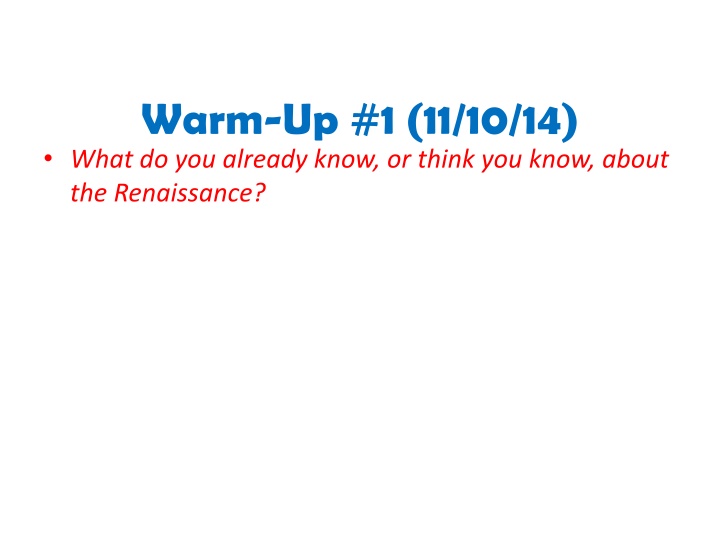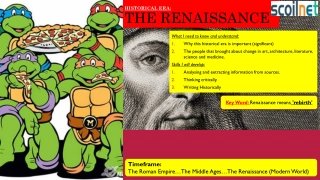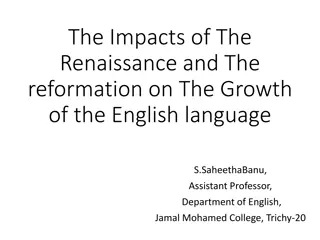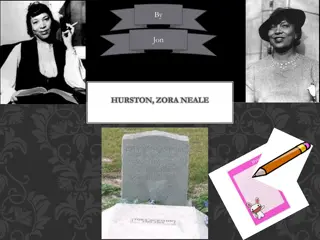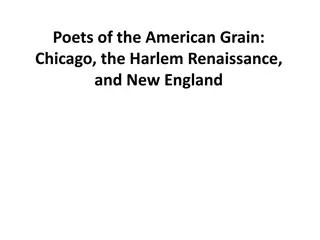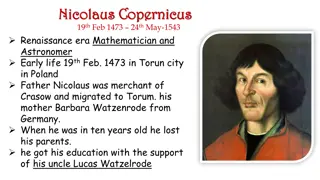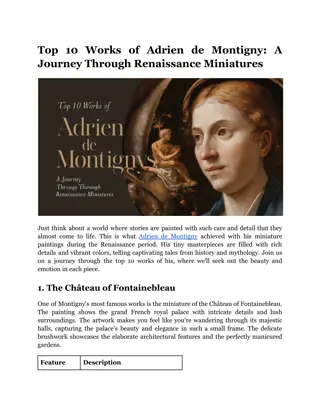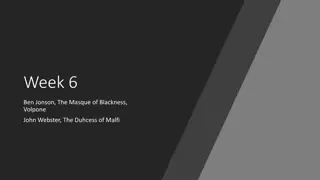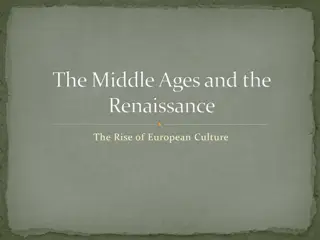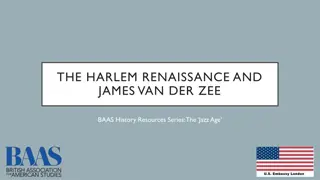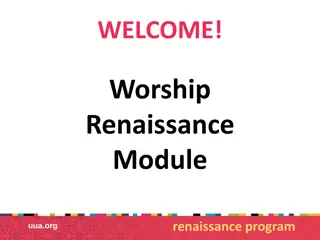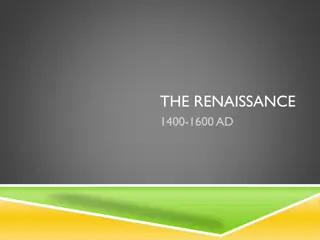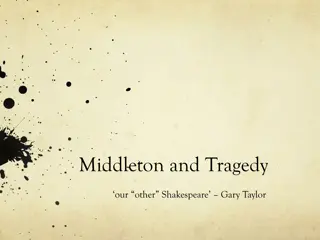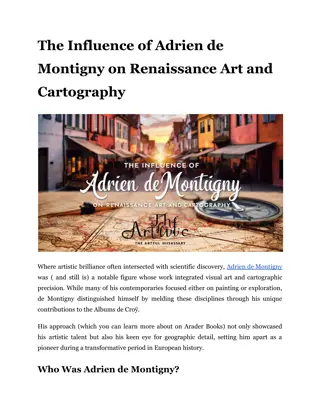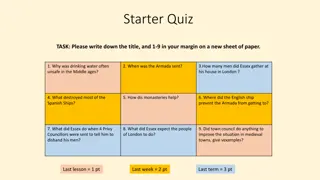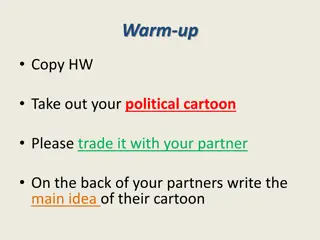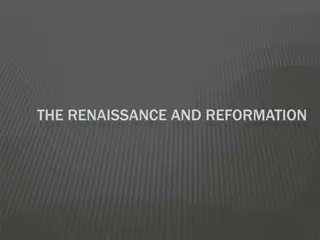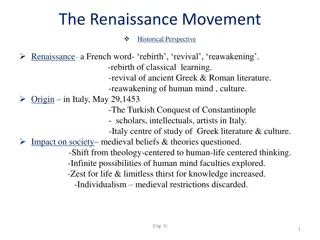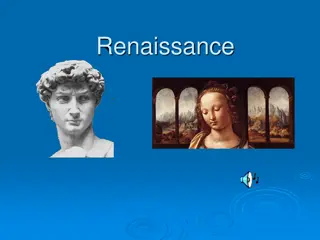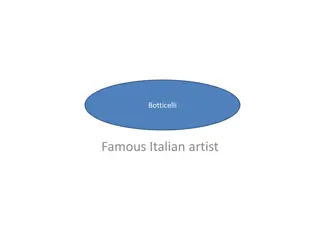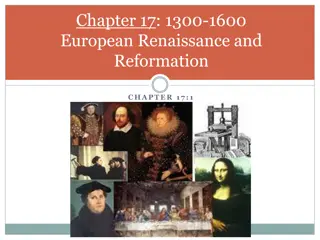Renaissance Warm-Up Activities Series
This series of warm-up activities covers various aspects related to the Renaissance period, including general knowledge about the Renaissance, distinguishing between the Middle Ages and the Renaissance, exploring Machiavellian principles, matching art descriptions with artists, and discussing rules at MHS. The activities engage students in critical thinking and historical analysis.
Uploaded on Oct 10, 2024 | 1 Views
Download Presentation

Please find below an Image/Link to download the presentation.
The content on the website is provided AS IS for your information and personal use only. It may not be sold, licensed, or shared on other websites without obtaining consent from the author.If you encounter any issues during the download, it is possible that the publisher has removed the file from their server.
You are allowed to download the files provided on this website for personal or commercial use, subject to the condition that they are used lawfully. All files are the property of their respective owners.
The content on the website is provided AS IS for your information and personal use only. It may not be sold, licensed, or shared on other websites without obtaining consent from the author.
E N D
Presentation Transcript
Warm-Up #1 (11/10/14) What do you already know, or think you know, about the Renaissance?
Warm-Up #2 (11/11/14) For each of the following write M.A. if it applies to the Middle Ages or R if it applies to the Renaissance or B if it applies to Both Believed past was unimportant More concerned with future (heaven or hell) Believed in God Focused on individuality Focused on survival Church was ultimate authority Earthly fulfillment is important Praise to man was a praise to God Intellectual movement known as Humanism began Little chance in improving status in life
Warm-Up #3 (11/12/14) How Machiavellian are you? For each of the following write Agree, Undecided, or Disagree 1. Most people are honest 2. Most people think first of their pocket-books and later about what is right and wrong 3. To get someone to like you, tell that person what he/she wants to hear 4. The best way to earn someone s respect is to be kind and honest 5. The best way to earn someone s loyalty is show him/her your power 6. There are no absolute rights and wrongs. Right is what works 7. A good president reads the polls to find out what people want and makes those things his policies 8. Most people are extremely selfish 9. A promise is a sacred trust 10. Nice guys finish last
Warm-Up #4 (11/13/14) Match the art description on the left with the artist on the right: 1. Known for his sculptures, David and Pieta, as well as painting the Sistine Chapel Botticelli Donatello 2. Created 1st life-size free standing nude (in bronze) since classical period Albrecht Durer 3. Known for paintings with classical themes/mythology Raphael 4. True Renaissance man who incorporated his study of many subjects into his paintings and sketches of the devices he invented Leonardo da Vinci Michelangelo 5. Northern Renaissance artist who was known for his engravings Hans Holbein the Younger 6. Court painter for Henry VIII known for his portraits 7. Artist known for his paintings of the Madonna and Christ child
Warm-Up #5 (11/14/14) 1. Which rules at MHS do you MOST disagree with? 2. How could you go about voicing your objection to them? 3. What might happen to you if you did object to them?
Warm-Up #6 (11/17/14) Review the new MHS Social Studies Recovery policy and explain how it is similar to the selling of indulgences during the early 1500 s in Europe.
Warm-Up #7 (11/18/14) Match the description on the left with the person/term on the right: 1. Excommunicated Luther from the Catholic Church Martin Luther Henry VIII 2. This allowed Henry VIII to become head of the Anglican Church (Church of England) John Calvin 3. Religious leader who believed God had already chosen a group, the elect, for heaven Leo X Act of Supremacy 4. Wanted a divorce from his first wife, Catherine of Aragon, but the Pope refused to give him one Indulgences 5. Objected to the Catholic church selling indulgences and nailed his Ninety-Five Theses to a church door in Germany Catholicism Protestantism 6. Religion that includes Lutheranism, Calvinism, Presbyterianism, and Anglicanism 7. Pardons for sins
Warm-Up #8 (11/19/14) For each of the following write C if it applies to Catholicism (Pre-Reformation) and P if it applies to Protestantism 1. Bible is sole source of truth 2. Salvation by faith and good works 3. Pope is head of church 4. People don t need priests to interpret the bible for them 5. People are saved by faith alone 6. Clergy cannot marry 7. Priesthood of all believers 8. Bible only read in Latin 9. Elaborate ceremonies/churches 10. Includes Lutheranism, Anglicanism, and Calvinism
Warm-Up #9 (11/20/14) Answer the following questions based on your chart: 1. Before the Scientific Revolution, what were the 3 sources of truth ? 2. Explain the difference between the Geocentric Theory and the Heliocentric Theory 3. Which scientists helped prove the Heliocentric Theory? 4. Why was Galileo called before the Church Inquisition? 5. How did Europeans worldview change as a result of the Scientific Revolution?
